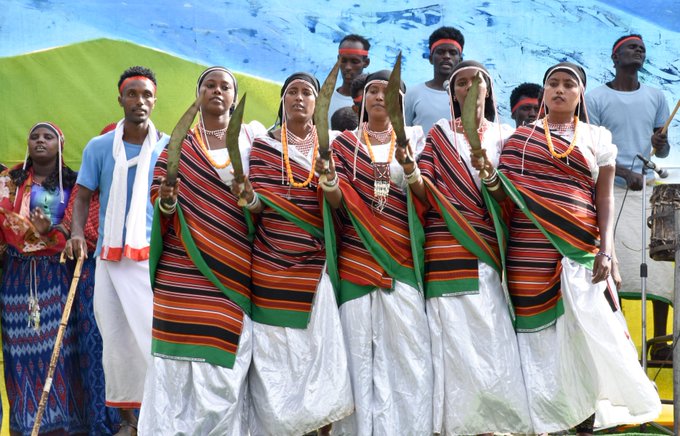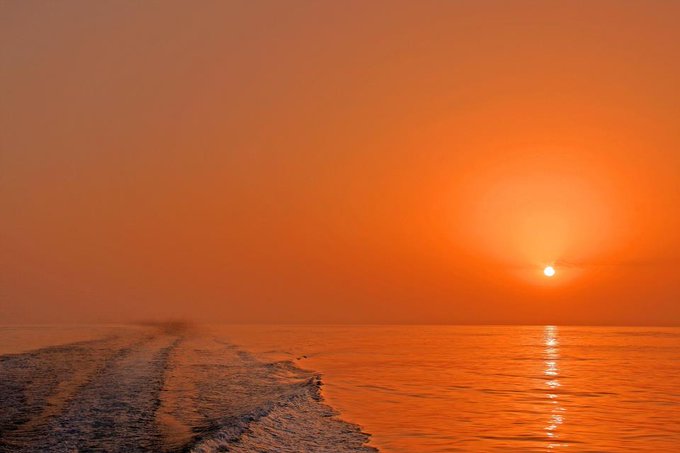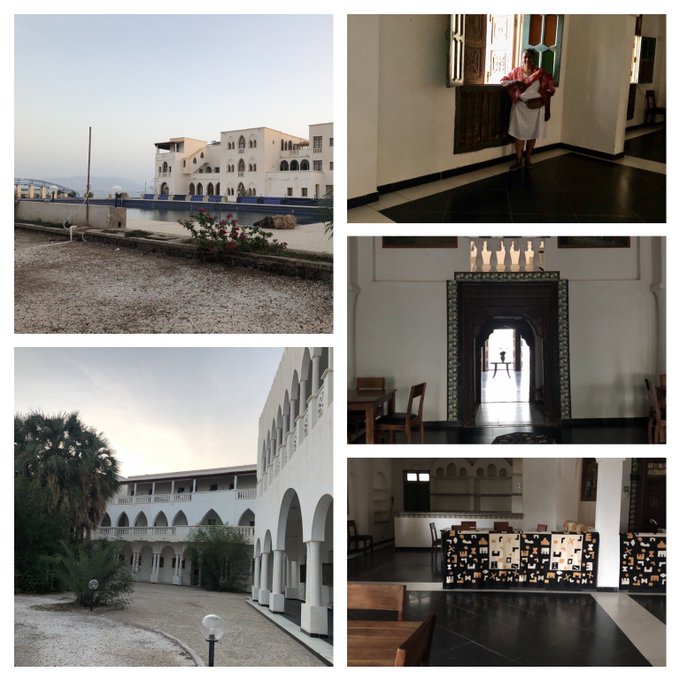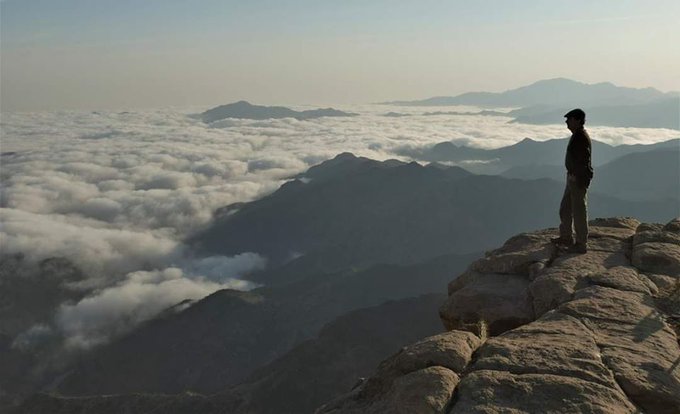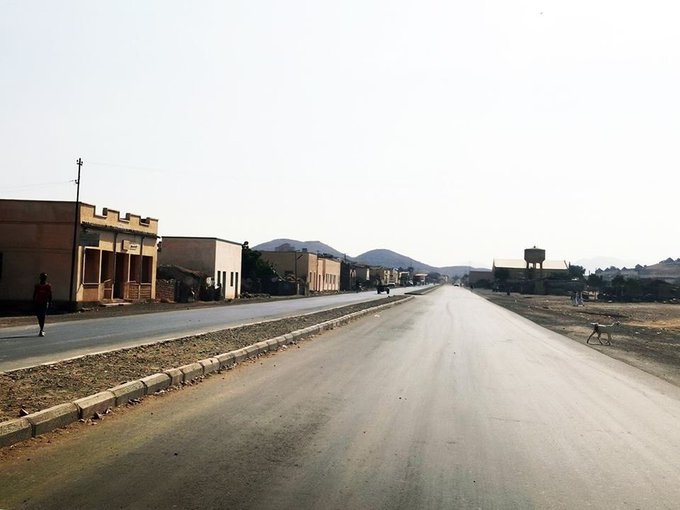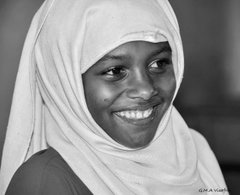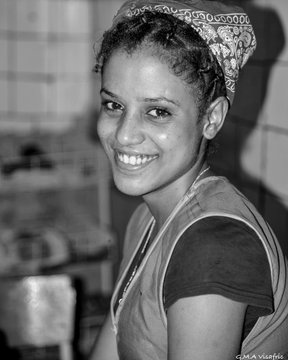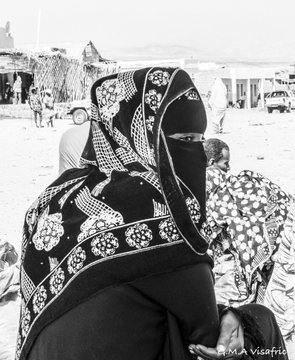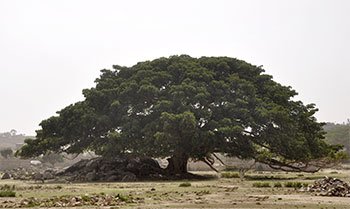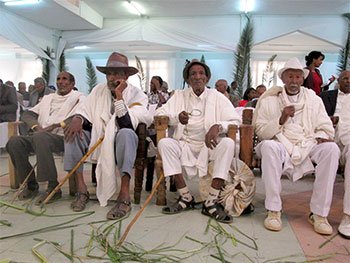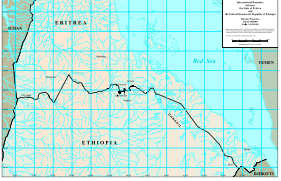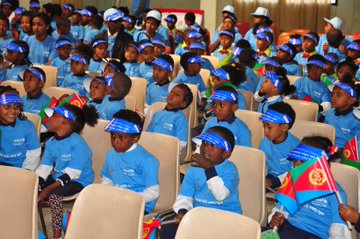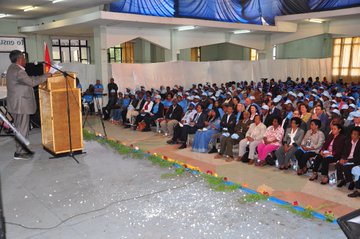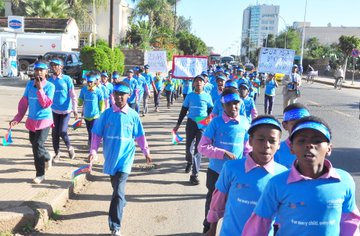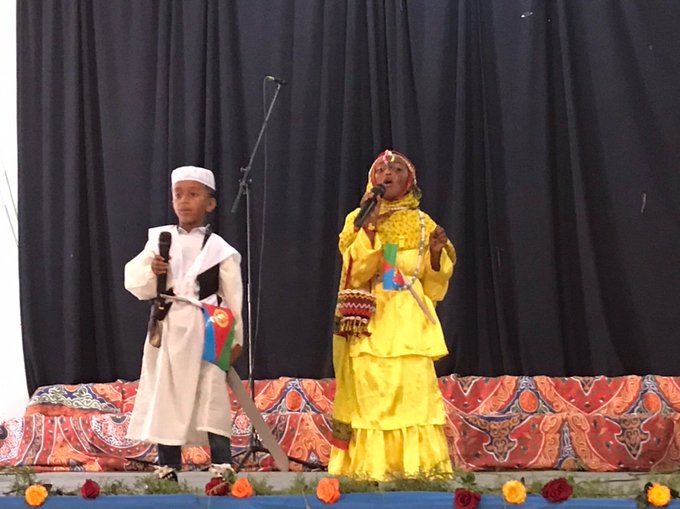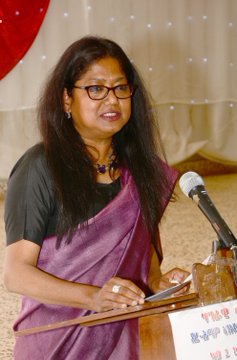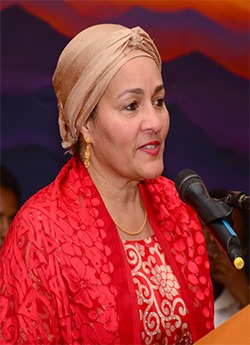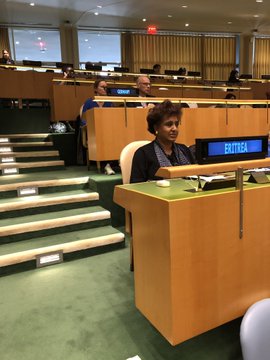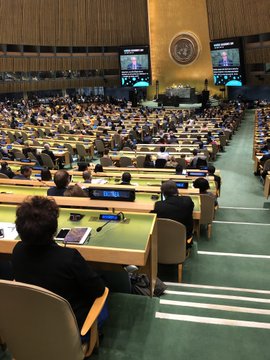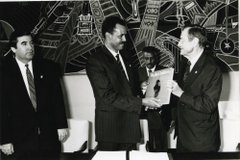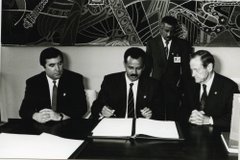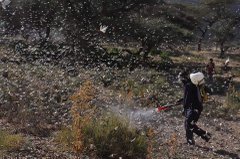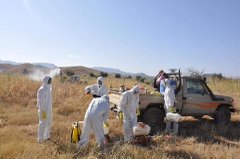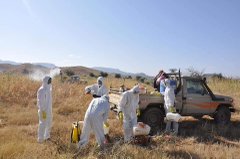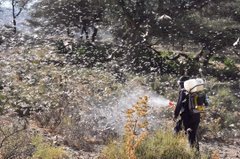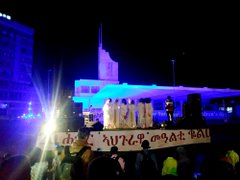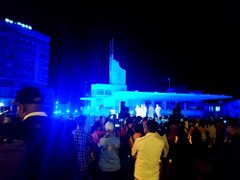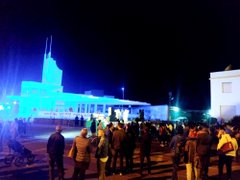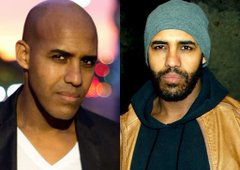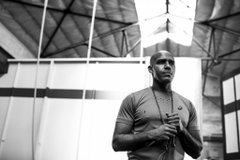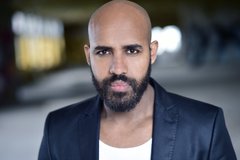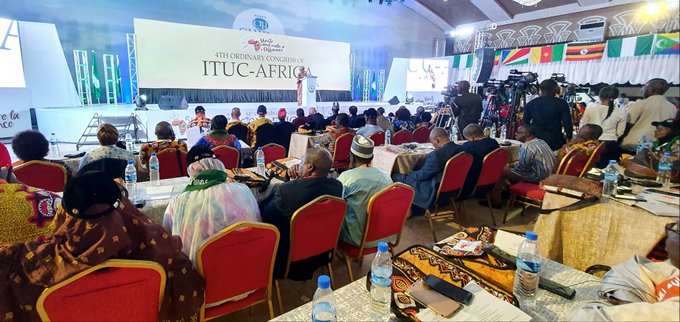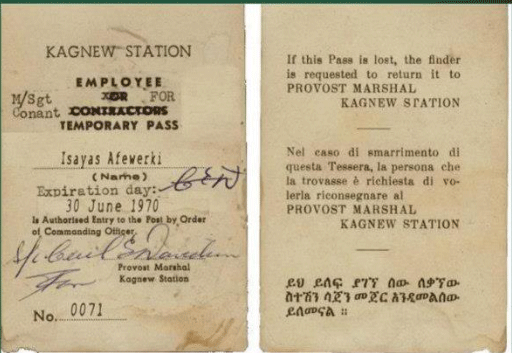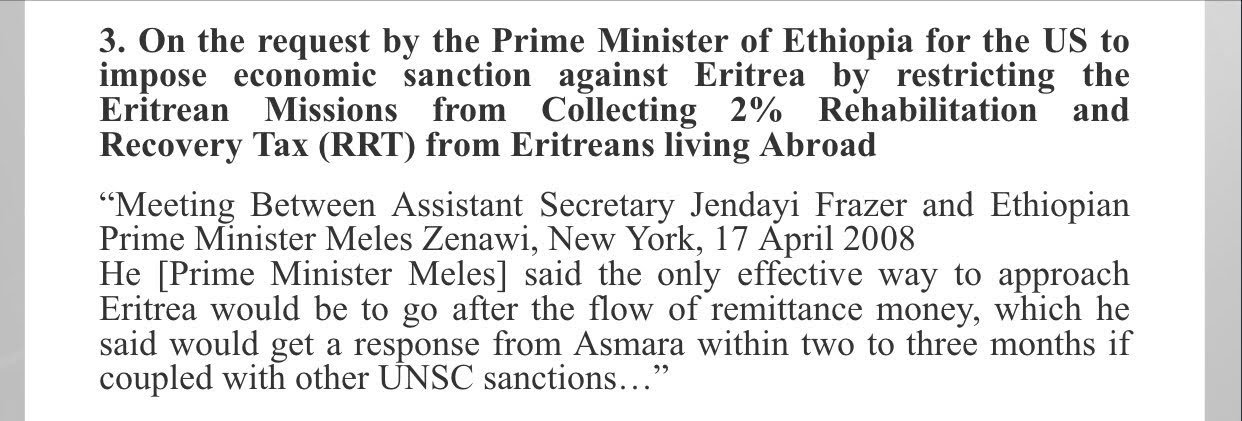
ERITREA
Eritrea blames CIA for boycott
This is an exclusive interview with the Eritrean Minister of Information
Guido Talarico
https://eastwest.eu/en/inside-news/yema ... ccuses-cia
Tuesday, 19 November 2019

Il Presidente dell'Eritrea Isaias Afwerki e il Primo Ministro dell'Etiopia Abiy Ahmed arrivano alla cerimonia di inaugurazione in occasione della riapertura dell'ambasciata eritrea ad Addis Abeba, Etiopia, 16 luglio 2018. REUTERS/Tiksa Negeri
A few days ago, the Eritrean Ministry of Information published documents https://eastwest.eu/en/inside-news/cons ... rea-asmara that would prove the involvement of the CIA (the US secret services), & Mossad (the Israeli services) and some NGOs in a series of activities aimed at boycotting Eritrea. Activities that, they say in Asmara, led to a long isolation which had the objective of weakening the country, which had been engaged for years in a difficult border war with Ethiopia. After the peace between Ethiopia and Eritrea, signed last year by the Eritrean President Isaias Afewerki and the new winner of the Nobel for peace, the young Ethiopian leader, Abiy Ahmed, relations between the two countries have returned to normal and this has allowed a relaxation of relations both throughout the Horn of Africa and between Asmara, Washington and Brussels. And it was precisely this newfound climate of relaxation, that probably allowed the publication of documents proving the history of the boycott that in truth Eritrea had long been denouncing. To better understand how things went, we asked to speak with the Eritrean Minister of Information, Yemane Gebremeskel, who agreed to give us this exclusive interview.
Minister Yemane, the evidence you have made public about the destabilization of Eritrea by the secret services of many countries; including the CIA and the Israeli Mossad, has surprised many international observers. There were rumours circulating and complaints from Eritrea in this regard, but no concrete findings. Was this attempt to boycott, to subvert a sovereign state a surprise for you too?
“Surprise” is really an understatement. Deplorable and inexcusable, are more compelling and appropriate terms. Because this is not the first time, that Eritrea was sacrified on the altar of the “perceived strategic interests” of a global power. Let us recall what transpired in the late 1940s, during the period of Africa’s decolonisation. Eritrea’s right to independence, after 50 years of Italian colonial rule, was suppressed to satisfy US perceived strategic interests in the region in the context of the Cold War. As it happened, Eritrea was forced into a bogus “federal relationship” with Ethiopia simply because Imperial Ethiopia was a “faithfull ally” of the United States which wanted to establish an eavesdropping station in Asmara; Eritrea’s capital. The cost, in human life and economic devastation that this entailed to the Eritrean people is enormous indeed. Now, fast forward to these contemporary times. Eritrea and Ethiopia, went through a difficult “border war”. The two countries signed the Algiers Peace Agreement brokered and guaranteed by the US and the EU, among others. The matter was referred to an international Arbitral Body (EEBC), in accordance with the explicit terms of the Agreement. The Award was rendered, in April 2002. Eritrea accepted, its treaty obligations. Ethiopia rejeced the Award and continued to occupy sovereign Eritrean territories. The Peace Agreement has specific clauses on punitive measures (Chapter VII), on the recalcitrant party. The UNSC (US and EU), should have imposed sanctions on Ethiopia. But for the same considerations as in the late 1940s, these powers chose to violate international law, protect Ethiopia and penalize Eritrea. In an act of unparalleled cynicism, sanctions were imposed on Eritrea (2009 & 2011) on the basis of spurioius pretexts. The hostility cited above, was a simple extension of this act.
Reading the reconstruction of the facts, we were surprised to see the means and the amount of measures that were put in place to cause a regime change in Eritrea. Particularly striking is the role-played by Amnesty international, Freedom House and UN bodies such as UNHCR. What do you think?
First, let me clarify one critical point. “Regime change”, is actually a misnomer. The purported end game of these unwarranted acts, is to roll back Eritrea’s hard-won independence and compromise its sovereignty. As for these complicit organizations, the onus is on them to explain their misconduct. Malicious acts against Eritrea, is not confined to this single incident. UNHCR has remained the primary vehicle, for the policy of “strategic depopulation” against Eritrea. It issued two “Eligibility Guidelines” on Eritrea – curiously in 2009 and 2011 – that advocated for extension of
especially the youth and National Service Members.blanket asylum rights to all Eritrean migrants;
This document was circulated “confidentially” to European countries. UNHCR, has an Office in Eritrea. But this was never communicated, to the Government of Eritrea. Freedom House, issues annual reports on all countries and its latest report mendaciously portrays Eritrea as
The Special Rapporteur on Eritrea at the UNHRC in Geneva, was a former official at AI. In brief, these entities have been at the forefront in propagating the negative narrative – the smear and demonizing campaigns - against Eritrea.the worst violator - more than North Korea - of press freedom.
Europe was reluctant in this matter at first and then ends up not opposing but even endorsing this project, which is incredible, especially since we are talking about events that took place in 2011 and not about the years in which the regimes were changed according to the wishes of the great powers. How do you rate this attitude, on the part of Europe?
I think, broadly speaking, European foreign policy is closely aligned with and kowtows that of Washington; especially in our region. But what we wish to stress here is the perils of arbitrary flouting of international law; the pursuit of policies that lack balance. These are not only morally deplorable but they will not, ultimately, serve the long-term interests of Europe and the US. Yes, in the short term, Eritrea has borne the brunt of these unwarranted policies. But instability in this strategic region, can only have negative consequences to Europe too. We see no long-term benefits and advantages for Europe in destabilizing Eritrea, which straddles the important maritime route in the Red Sea. Therefore, it is time for Europe to review its policies and make amends for the wrongs done to Eritrea in the past decades.
The first time I came to Eritrea, more than three years ago now, I must say that I was myself the victim of the strong media campaign organized against your country. I was reading about things, that I did not find in reality. Not even when I went to Geneva to listen to the outcome of the report on human rights, did I find confirmation between what I had seen and what they were saying. I found it difficult to understand why so much hassle was being done, against a small country. Today, the reasons are clear to me. How did you manage to cope? It seems incredible, that Eritrea has emerged unscathed.
Eritrea has paid a heavy price, even if it has emerged triumphant at the end of this long period of unjustified hostility. Prolonged war and state of belligerency, sanctions and other types of harassment, hemorrhage of its human resources through human trafficking and foreign induced migration have diminished its developmental prospects and opportunities. Resilience and appropriate remedial policies by the Government and people of Eritrea have blunted the instruments of antagonism and adversity, but we cannot downplay the cost incurred on Eritrea.
It turns out that "human rights" was one of the strong themes of this campaign, the instrument of greatest pressure to negatively affect international public opinion. How could it have happened, that representatives of authoritative NGOs have been the instrument of this conspiracy?
How and why these “NGOs” were involved in, and colluded with, subversive agendas is for them to explain. Obviously, it is linked with financing and in some cases, their very origin. In any case, the key problem for us is that the harm is further amplified because these institutions have the aura and wear the mantle of
The other theme, was refugees. It would seem that the smuggling of migrants from Eritrea was even organized to empty Eritrea of young people and thus not allow it to defend itself at its best in the war against Ethiopia. What do you think?independent, civil society entities.
I have touched this point, in my previous response. The “special treatment” for Eritrean migrants, the decision to give them “automatic asylum” was precisely devised to implement the malicious policy of “strategic depopulation”; to wean the youth from national service and developmental efforts to downgrade Eritrea’s defense and developmental capabilities and opportunities. This is being pursued even today; when the dynamics in the region has changed in very positive and significant ways. Few months ago, the Government of Canada announced its plans to extend asylum to thousands of Eritreans in the Sudan. Germany airlifted some 170 Eritreans from Addis Abeba to Kassel in October this year and announced similar arrangements for a second batch in November this month. This is floated, in order to keep the flow. In most cases, especially in recent years, those who are encouraged to flee the country are housed in camps in their new places of residence. Therefore, the harm is not restricted to short-term consequences. Also in the long term, these victims of organized human trafficking will not acquire employable skills; they will not be able to integrate in the host country. Therefore, their future is at stake; it is a loss to Eritrea and a burden to these countries in the long term. These were indeed the cogent reasons why President Isaias urged the UN Secretary General, as early as 2015, to undertake a comprehensive investigation of this phenomenon for prompt remedial action. The UN has not acted on this request, to date. However, this scourge must stop without further delay. The first measure, is for UNHCR to rescind its “Eligibility Guidelines” and for European countries to reverse their policy on Eritrean migrants.
Peace with Ethiopia has changed the overall picture and you are no longer seen as an enemy. Today, you are seen as a stabilizing factor for the Horn of Africa and your role in the region is appreciated in Washington as well as in Brussels. What was the point of releasing this information today, now that you have normalized relations with the United States and with yesterday's enemies?
These are indelible historical facts and making them public has no purpose other than, enabling our people to draw appropriate lessons from what transpired in the past. (Obviously, it also sends a subtle message to those who harbor ill-will to Eritrea particularly as the cases made public are only a couple among many). Our political culture is otherwise geared, towards looking into the future. We do not hark back to, or dwell, in the past in a vindictive mindset. I remember, the speech President Isaias made in Algiers in December 2000 when the Peace Agreement was signed with Ethiopia in the presence of the late Algerian President Abdel-Aziz Bouteflika; UN Secretary General Kofi Annan; Madeleine Albright, (then US Secretary of State); and, Senator Serri representing the EU, among others. His exact words were:
This was at the peak of a second vicious war with Ethiopia; in which we lost the precious lives of almost 80,000 of our freedom fighters and National Service Members (in the war of liberation and border war). This statement embodies a healthy attitude, which is deeply ingrained in our culture; a culture of forgiveness and positivity even when confronted with formidable odds.We are not cursed but blessed to be neighbors with Ethiopia.
What is the situation in Eritrea today and how do you see its future prospects in political, economic and social terms?
These are, historical times. A conducive regional climate of peace, stability and meaningful cooperation will have substantial dividends to economic growth in Eritrea and Ethiopia; as well as the wider region. In as far as Eritrea is concerned, partly due to history and also because of judicious policies, religious and ethnic fault lines which are preponderant in our region are conspicuous for their absence. The policy of social justice – which translates into leveling the playing field in terms of opportunities for all citizens – has further cemented the social contract of internal harmony. The economic challenges we face due to the adversities described above, will be surmounted in a matter of years. The Government has funneled substantial funds and efforts for human capital in the past decades, in spite of all the adversity. In terms of potential sectors that will contribute to significant and sustainable development, the opportunities are vast indeed. Eritrea can leverage its locational advantage for port and other services to the wider region; fisheries, agriculture, tourism, the extractive industry, manufacturing can all be developed through public and private investment. Therefore, the prospects for rapid and sustainable growth are considerable indeed.
@GuidoTalarico
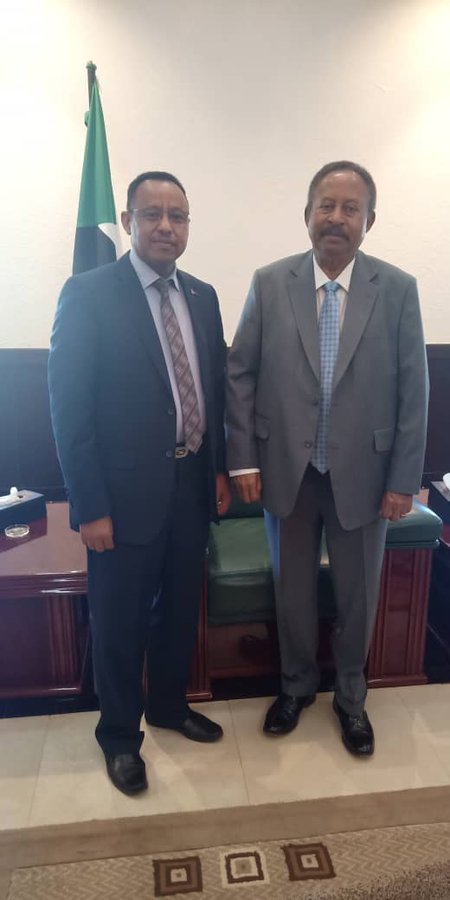
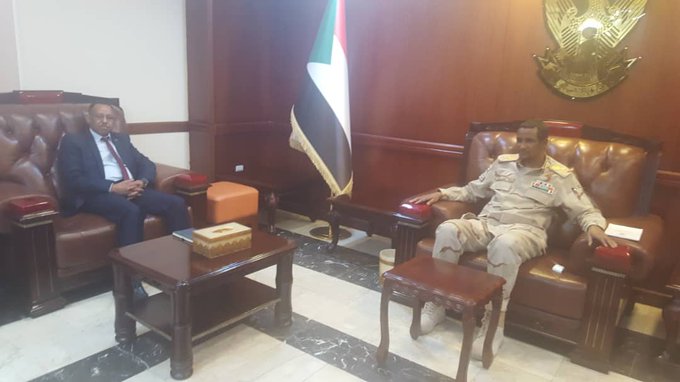
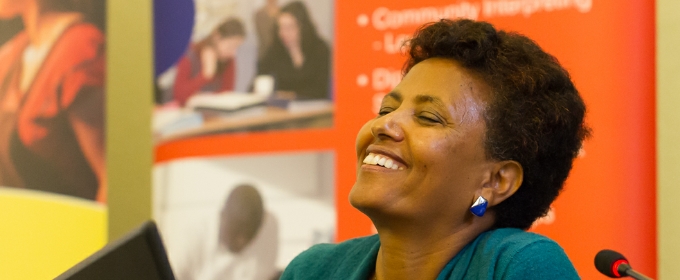 ....
.... 